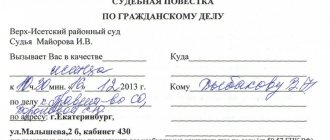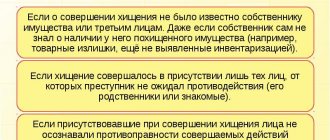The fact of theft of property can be revealed either during an audit (inventory) or at the time of the commission of the offense. The troublemaker can be stopped by inspectors at the checkpoint, or the moment of the theft can be recorded by a video camera installed in the premises. And here is the main intrigue. The fact is that if you want to get rid of a dishonest employee, you must strictly comply with all the requirements of the law so that the lawyer does not “turn his nose.” Otherwise, it is quite possible that the court will reinstate the thief at work, and you will still have to pay him for the time he was forced to miss.
"I do not trust you…"
It should be noted that in some cases it is possible to get by with little bloodshed, without the involvement of internal affairs bodies, investigations and trials. If the amount of damage revealed during the audit is insignificant and management does not have sufficient evidence that the property was stolen, then you can say goodbye to the employee in accordance with clause 7, part 1, art. 81 of the Labor Code of the Russian Federation - due to loss of trust.
As explained by the Supreme Court of the Russian Federation, termination of an employment contract for this reason is possible only in relation to employees directly servicing monetary or commodity assets (reception, storage, transportation, distribution, etc.), and provided that they committed actions that gave the employer grounds for loss of confidence in them. Also, these employees can be dismissed due to loss of confidence and in cases not directly related to their work: when it is established that theft, bribery and other selfish offenses have been committed (clause 45 of the resolution of the Plenum of the Armed Forces of the Russian Federation dated March 17, 2004 No. 2).
Simply put, if a cashier of an organization, while shopping in a store after work, stole a package of cookies, and the employer found out about it, then such a cashier can be fired. After all, a director can hardly trust an employee with large sums of money when he steals goodies from the store in his free time.
Documentary red tape
When discovering facts of loss of property (or other actions, for example, weighing, shortchanging customers, using accountable valuables for personal purposes, destroying valuables, etc.), the first thing the employer should do is ask the employee for an explanation. An employee can come up with a reason for what he did for two days. This is exactly the period allocated for this by the Labor Code (Article 193 of the Labor Code of the Russian Federation). It is advisable to request explanations in writing, handing this request to the employee against signature. From now on, every step must be documented. So, if the employee did not provide an explanation, this must be recorded in the act.
Can pregnant women do anything?
If an employee who took, for example, a box with jars of pickles from the procurement workshop turned out to be pregnant, then the employer will only have to complain about the hormonal explosion, or, in extreme cases, reprimand her. A pregnant woman cannot be fired either due to loss of trust or due to theft of someone else’s property at her place of work. The Labor Code allows the dismissal of pregnant women at the initiative of the employer only in the event of liquidation of the organization (Part 1 of Article 261 of the Labor Code of the Russian Federation).
In addition, it is necessary to draw up orders for the application of disciplinary sanctions (dismissal) and the order for dismissal itself (according to the unified form No. T‑8, approved by Resolution of the State Statistics Committee of Russia dated 01/05/2004 No. 1).
Summarizing what was said above, we emphasize that dismissing an employee who has encroached on someone else’s property on the grounds specified in clause 7 of Part 1 of Art. 81 of the Labor Code of the Russian Federation (due to loss of trust), is possible only if the employee directly handles funds and material assets. This condition does not necessarily follow from an agreement on full financial liability. These functions of employees can be enshrined in an employment contract, job description, and other similar documents. The procedure for dismissal established by law must also be strictly observed. And from the above resolution of the Plenum of the Armed Forces of the Russian Federation it follows that the employer must prove that the employee committed guilty actions that led to the loss of valuables. Otherwise, there is a high probability that the court will consider the dismissal illegal and order the employee to be reinstated. For example, the Moscow City Court, in its ruling dated June 22, 2010 No. 33‑18390, declared the employer’s actions illegal because:
- the organization has not proven the validity of the dismissal (i.e., the mere fact of surplus and shortage of goods is not enough for dismissal);
- the order was signed by an unauthorized person (not a manager);
- the employee was not given two days to provide written explanations.
Dirty laundry
There are situations when a loss of trust alone is not enough. For example, if the amount of theft is significant and it will have to be recovered through court, or if the valuables were stolen not by the cashier or storekeeper (i.e., the person directly servicing the valuables), but by a manager or accountant. An employee who has committed theft or embezzlement of property can be dismissed in accordance with paragraphs. "g" clause 6, part 1, art. 81 of the Labor Code of the Russian Federation. You can fire an employee who has misappropriated property not only of the employer, but also of third parties (for example, a video camera recorded how a late employee grabbed a cell phone forgotten by a colleague). Depending on the size of the theft, the employee may be brought to either administrative (Article 7.27 of the Code of Administrative Offenses of the Russian Federation) or criminal (Articles 158, 159, 160, 164 of the Criminal Code of the Russian Federation) liability.
In order for you to have the right to dismiss an employee on the specified basis, the fact of theft must be confirmed either by a court verdict in a criminal case that has entered into force, or by a resolution in a case of an administrative offense (subclause “d”, paragraph 6, part 1, article 81 of the Labor Code RF, paragraph 44 of the resolution of the Plenum of the RF Armed Forces of March 17, 2004 No. 2). An order to terminate an employment contract must be issued no later than one month from the date of entry into force of a court verdict or decision of a judge (body, official) authorized to consider cases of administrative offenses (Article 193 of the Labor Code of the Russian Federation, paragraph 44 of the resolution of the Plenum of the Armed Forces of the Russian Federation dated 03/17/2004 No. 2).
So, having convicted an employee of an unseemly offense, you must take the following actions:
- document the fact of theft;
- confirm the fact of theft with inventory results;
- file a complaint with law enforcement agencies.
The discovery of the fact of theft must be documented in an official memorandum, which sets out all the circumstances of the incident (date, time, place, who discovered, etc.). Also, as mentioned above, the Labor Code obliges employers to request an explanation from the employee before applying a disciplinary sanction (including dismissal) (Article 193 of the Labor Code of the Russian Federation). In addition, the manager can order an investigation, during which clarification can be requested from the employees responsible for storing these valuables, or other employees who can explain something about this matter (cleaners, watchmen, security guards).
All of the above documents (memo, employee explanations, inventory report) can be attached to the application, which a representative of the organization must submit to the police department on duty.
After a court verdict or resolution in a case of an administrative offense enters into force, an employee can be dismissed in accordance with paragraphs. "g" clause 6, part 1, art. 81 of the Labor Code of the Russian Federation. An employee can be dismissed in connection with committing theft at the place of work no later than one month from the date the court verdict or resolution enters into legal force (part 3, paragraph 44 of the resolution of the Plenum of the Armed Forces of the Russian Federation dated March 17, 2004 No. 2).
Types of liability provided for theft at work
In general, for theft in the workplace, it is possible to impose various responsibilities on the thief, which can be:
- Disciplinary;
- Administrative;
- Criminal.
Theft of property at work provides an opportunity for the employer to subject such employee to disciplinary action. At the same time, the Labor Code directly provides for the possibility of dismissing an employee due to theft. Other types of disciplinary punishment that an employer can subject an offending employee to are a reprimand or reprimand. The difference between these two types of punishments is not regulated by law - both a reprimand and a reprimand are issued in any form, require an explanation from the employee and may imply subsequent liability.
In addition, the Code of Administrative Offenses of the Russian Federation and the Criminal Code of the Russian Federation provide for the usual types of liability for theft, regardless of whether it was committed at work or not, without providing separate formulations dedicated specifically to the workplace.
Important fact
Disciplinary liability for theft is imposed together with administrative or criminal liability, depending on the severity of the offense. At the same time, the imposition of such liability is the right, but not the obligation of the employer.
Administrative liability for theft is imposed if the total amount of damage caused to the employer, colleagues or third parties does not exceed 2.5 thousand rubles, and the offense itself does not carry certain aggravating circumstances specified in Art. 158, 159 and 160 of the Criminal Code of the Russian Federation.
Criminal liability is imposed and theft is classified as a crime if it meets at least one of the following points:
The total amount of stolen property was more than 2.5 thousand rubles;- The theft was committed by a group of persons by prior conspiracy;
- It was accompanied by fraudulent activities;
- If the theft was carried out with illegal entry into the premises or protected area;
- When theft bears signs of embezzlement.
According to the above-mentioned articles of the Criminal Code of the Russian Federation, theft can be carried out either in the form of direct theft, that is, illegal secret taking of someone else’s property, or in the form of fraud or embezzlement. Embezzlement in this case means the misuse of funds entrusted to an employee for the purpose of personal gain.
A right, not an obligation
It is worth noting that the employer is not at all obliged to fire an employee who is caught stealing or having a questionable deficiency. Dismissal due to loss of confidence (based on clause 7, part 1, article 81 of the Labor Code of the Russian Federation) and theft of other people’s property at the place of work (clause “d”, clause 6, part 1, article 81 of the Labor Code of the Russian Federation) is a disciplinary measure penalties that the employer can apply to the employee (or not apply) at its own discretion.
Attention!
Only one disciplinary sanction can be applied for one disciplinary offense. This follows from Part 5 of Art. 193 of the Labor Code of the Russian Federation. If, for example, you catch an employee embezzling, reprimand him and immediately fire him, the court will reinstate him at work (decision of the Moscow Regional Court dated June 1, 2010 No. 33-10485, determination of the Leningrad Regional Court dated January 14, 2010 No. 33-92 /2010, ruling of the Nizhny Novgorod Regional Court dated September 29, 2009 No. 33‑7420/2009).
Even the very fact of a conviction or a decision imposing an administrative penalty against an employee does not mean that the employer is obliged to fire him. At the request of the manager, any other types of disciplinary action established by Art. 192 of the Labor Code of the Russian Federation (remark, reprimand).
And only if the employee is sentenced to imprisonment, the employer will be forced to fire him. If the employer has already applied another disciplinary sanction (for example, a reprimand) for the theft for which the employee was convicted, then the employee can be fired due to circumstances beyond the control of the parties. In particular, as one of such circumstances, the Labor Code names the conviction of an employee to serve a sentence that precludes the continuation of previous work in accordance with a court verdict that has entered into legal force (Clause 4, Part 1, Article 83 of the Labor Code of the Russian Federation).
Concept
Industrial theft is a serious crime. The employee risks being caught and fired. Despite this, there are people who still try to appropriate other people's property.
The legislator did not provide a separate article that would establish liability for theft at an enterprise. But there is a general art. 158 of the Criminal Code of the Russian Federation, which provides sanctions for all types of theft. Therefore, committing an illegal act in the workplace will be classified according to this.
I demand satisfaction!
In addition to dismissal (or other disciplinary action), the employee faces punishment in the form of compensation to the employer for direct actual damages. Lost income (lost profits) cannot be recovered from an employee (Article 238 of the Labor Code of the Russian Federation). In case of theft, embezzlement, or shortage, the amount of damage is determined based on inventory data.
For the damage caused, the employee bears financial liability within the limits of his average monthly earnings, unless otherwise provided by the Labor Code of the Russian Federation or other federal laws (Article 241 of the Labor Code of the Russian Federation), for example, upon dismissal due to loss of trust (if the employer did not contact law enforcement agencies with statement of theft).
If an employee is accused of theft or embezzlement, then he is assigned full financial responsibility (clause 5 of Article 243 of the Labor Code of the Russian Federation). However, the amount of stolen valuables that exceeds the average monthly salary can be recovered from the employee only through the court (Articles 242, 243 of the Labor Code of the Russian Federation).
To recover the amount of damage, the head of the organization must issue an order to withhold money within a month after the amount of damage is established (Article 248 of the Labor Code of the Russian Federation). You can deduct no more than 20% from an employee’s monthly salary. If deductions are made from an employee’s income according to executive documents, then their total amount should not exceed 50% of the salary (Article 138 of the Labor Code of the Russian Federation).
Elena Rakova
Stealing money from a business
If money is stolen from the company's cash register, the punishment will follow depending on the amount of damage.
Note!
Large theft is considered to be theft in the amount of 250 thousand to 1 million rubles. Theft in the amount of more than 1 million rubles will be considered especially large.
Not only an employee who has direct access to money, but also an employee performing other functions can commit a criminal act. In order to prevent theft, large stores install video cameras directly above the cash register. To avoid being subject to disciplinary or criminal liability, a cashier who has direct access to money should maintain strict accountability and ensure the safety of funds.








